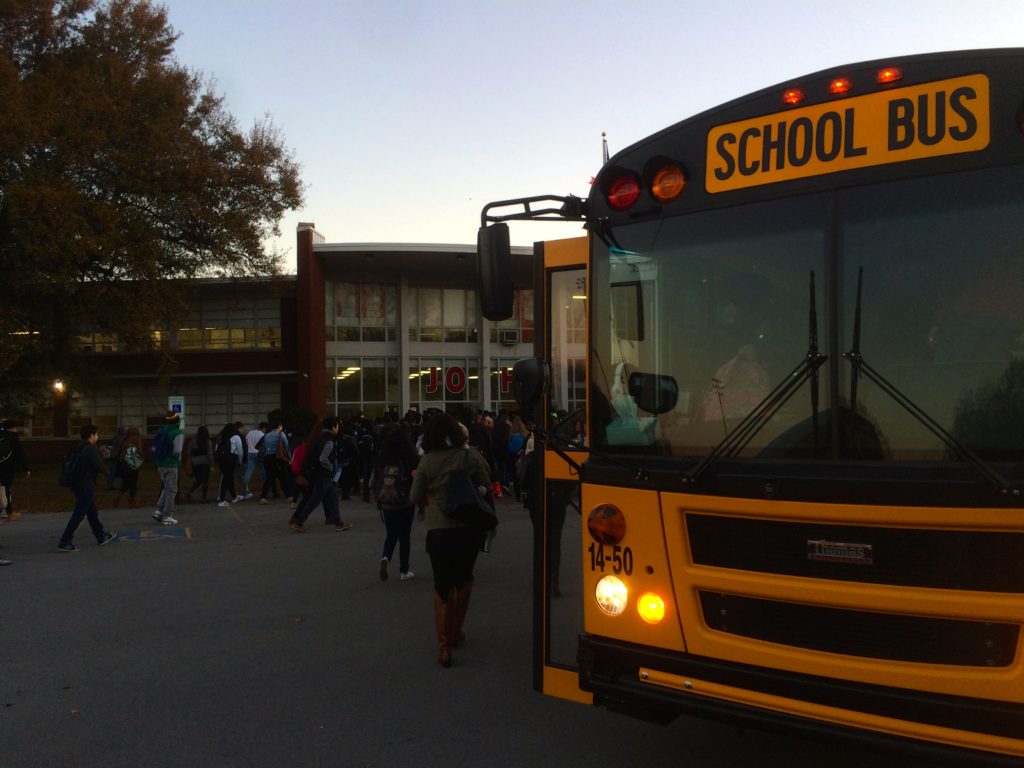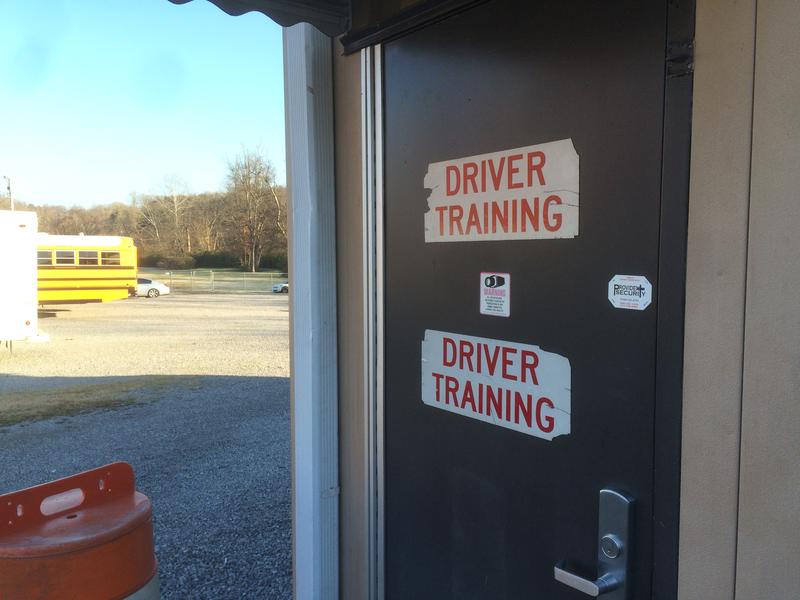
When a school district has a vacancy rate of 16 percent, it’s considered “desperate” for bus drivers. Nashville’s public schools have nearly 25 percent of their positions unfilled. So at this point, everyone is covering for someone.
The frustration is audible in the radio chatter between drivers.
“I just finished unloading at Mount View for my route. You want me to go pick up at Lakewalk?” one bus driver asks.
“10-4,” another driver responds. “I’ve got three more stops left.”
As of mid-December, Metro Schools has 550 slots and only 440 drivers, and that’s when no one calls in sick. Supervisors have been forced to get behind the wheel on many mornings.
As veteran driver Suzanne Adams drops off a load at Overton High School, she explains how earlier this year the south Nashville school had 10 routes with no dedicated drivers. Every day was a scramble.
“You should be doing three routes in the morning and three in the afternoon. I was doing six and a half in the morning, and six in the afternoon,” she says. “You’re just running back-to-back.”
Kids were left waiting and showing up to class after the bell rang. Annoyed parents found ways to drive their kids to school. But Souleen Ramazan, who rides on Adams’ bus, says she understands.
“It is a hard job,” the Overton sophomore says. “You have to wake up extra early in the morning…so it’s hard for them, too.”
The pre-dawn start-time isn’t the hardest part. For many, it’s not getting paid during all the breaks — spring break, fall break and Christmas break. There are some work opportunities during the summer, but those are offered based on seniority and are hardly full-time.
The pay gaps require some disciplined budgeting, even for someone like Suzanne Adams who is at the top of the pay scale.
“When the kids are out of school, we don’t get paid,” she says. “That’s really hard, so I do understand people going somewhere else.”

The job also involves much more than driving.
“I’ve said like every year that I’m going to quit and look for something else,” 10-year bus driver Tracy Garton says.
After sweeping through his bus to make sure no middle schoolers have stowed away, he lists recent behavior problems. He caught a student smoking marijuana on the bus. Another threw a bottle out the window and broke two windshields.
“You gotta sit with the police and go through all that,” he says. “It’s just stressful, you know. It’s not just like a regular job where you go in, work, and go home.”
And with the local unemployment rate approaching four percent, nine-to-five jobs are rather plentiful. Some drivers leave for surrounding districts that pay more. Others drive charter buses or 18-wheelers. The trucking industry has an even more pressing shortage than schools, meaning some companies are offering signing bonuses.
Pam Franklin is a driver who is now a Metro Schools supervisor. She used to be a long-haul trucker, and she still hears from family members about the perks.
“My brother makes $22 an hour,” she says. “He works eight or nine hours a day. He has benefits. And it’s a 12-month job.”
Metro Schools has taken
several steps in recent days to make compensation more competitive. Starting pay went up by a dollar-an-hour to $14.13, though it’s still less than the national average which is now at $15.20, according to a recent survey.
More:
Current Survey Data On School Bus Driver Staffing
There are also new quarterly bonuses for perfect attendance. And most important, the district will now guarantee 40 hours a week. Bus drivers were taken down to 35 hours as a way to cut costs during the recession.
“In the goal of not cutting from the classroom, which obviously is important, kind of an ancillary service like transportation can be one of the first places a school district looks to make cuts,” says Tom McMahon, executive editor of the trade publication School Bus Fleet.

McMahon surveys districts every year on their staffing levels. He says the city’s situation is one of the most “severe” he’s seen.
There’s a direct correlation between bus driver staffing and the jobless rate, McMahon says. When unemployment is high, districts have very little trouble finding drivers. But low unemployment spawns an exodus.
“School bus drivers in many cases just aren’t paid enough for the responsibility they have,” he says.

Nashville’s shortage has put driving on the radar of some brave job seekers, especially now that the money is more attractive. The school system is even paying new drivers while they’re working to get their commercial license.
Roman Steele, who was laid off from a warehouse job earlier this year, is studying for the written test.
“Pretty much I thought it’d be a cool opportunity,” Steele says. “I was like hey, I need a job, so I’ll give it a shot. It can’t be that bad.”


